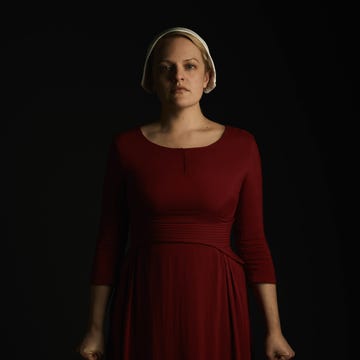Abortion rights have been making more headlines than ever. With the landmark overturning of Roe Vs Wade in the US in June of last year sparking conversation about a potential knock-on effect here in the UK, and this week's news of a woman's 28 month jail sentence, for misusing the 'pills by post' at-home abortions service. Contrary to popular belief, the right to abortion is not protected under UK law, with women still being actively prosecuted (and going to prison) for the act, and some fear that access to safe abortion could grow more difficult in years to come. Rebecca Cox reports.
Abortion In The UK: What’s Happening?
June 2022: Roe Vs Wade was overturned in the US, sparking conversation about whether there could be a knock-on effect in the UK.
June 2022: Labour MP Stella Creasy’s tabled amendment to the Bill of Rights to protect abortion as a human right received push-back in the House of Commons.
July, 2022: British government’s commitments on abortion and sexual health rights were removed from an official statement on gender equality, sparking condemnation from European countries and human rights groups. An open later to foreign secretary and Tory leadership candidate Liz Truss from more than 20 human rights, pro-choice and international aid groups demanded the reversal of the deletions stating: ‘it has never been more important for the UK government to stand up for sexual and reproductive health and rights and bodily autonomy.’
August 2022: A string of reports emerged in the British press highlighting women being prosecuted for abortion in the UK.
August 2022: Anti-abortion protests reportedly ramped up in the UK.
August 2022: A date was set for the ongoing challenge from anti-abortion campaigners to Westminster’s legal authority to direct the establishment of abortion services in Northern Ireland.
August 2022: In an unexpected turn of events, the 'pills by post' at-home abortions service, which was introduced as a temporary measure during the height of Covid-19 in 2020, would be made permanent.
June 2023: In a landmark case, a woman is sentenced to 28 months in prison, after it was found that she misused the 'pills by post' service, to induce an abortion when she was beyond the 10-week legal limit.
An Illegal Act?
It is not only the woman who pled guilty to misleading BPAS that we're discussing. Her case is not such an anomaly. Stories that women are being prosecuted for getting an abortion have been making waves in the media for the last couple of years. The Independent outlined how one 25-year-old woman in Oxford was due to stand trial in February having pled not guilty to administering misoprostol, one of two pills routinely prescribed by doctors to abort a pregnancy. The crimes that both of these women are accused of falls under the Offences against the Person Act 1861 and carries a potential sentence of life in prison. Another, who shared her story anonymously with The Sunday Times last year, was imprisoned for two years after having an illegal abortion.
To understand how this is occurring, let’s have a recap on current abortion law, as outlined by BPAS (British Pregnancy and Advisory Service). The act was partially decriminalised under the 1967 Abortion Act, but only providing it meets certain criteria. The law allows doctors to end a pregnancy if they believe that: continuing the pregnancy would be harmful to the physical or mental health of the woman or her existing children; an abortion would be less risky than continuing the pregnancy; or there is substantial risk that if the child was born it would suffer mental abnormality or serious physical handicap. Furthermore, two doctors must certify that the legal grounds for abortion are met, but do not have to meet the woman personally. When there is a substantial risk to the woman’s life, or a foetal abnormality, there is no legal time limit for abortion.
People are still being tried and convicted under the Offences Against The Person Act from 1861 for abortions that do not fulfil the criteria set out in the Abortion Act of 1967. Some groups and charities are now pushing for abortion to be completely decriminalised in the UK. The Royal College of Obstetricians and Gynaecologists (RCOG) and the Faculty of Sexual and Reproductive Healthcare (FSRH) published a policy statement renewing calls for the government to take action on this matter.
Pills By Post
There has been one step forward when it comes to abortion access across parts of the UK. Temporary measures were put in place during Covid lockdowns to allow women to access telemedicine for early abortion care. Dubbed the ‘pills by post’ scheme, the legislation allowed women to access pills for early medical abortion via a phone or online consultation. Both sets of pills supplied could be taken at home for pregnancies of up to nine weeks and six days. While plans were initially to scrap this service by the end of August 2022, Wales decided to make the scheme permanent, and a vote in March last year after revolt by MPs saw the scheme also made permanent in England. Maggie Throup, the public health minister that caused outcry in February by announcing the scheme would be scrapped, said this month: ‘The wellbeing and safety of women requiring access to abortion services is paramount. With these measures women will have more choice in how and where they access abortion services, while ensuring robust data is collected to ensure their continued safety.’
What’s The Party Line?
Shadow Secretary of State for Health and Social Care Wes Streeting told ELLE: ‘Every woman has a right to a safe and legal abortion should they need one. Restricting women’s access to abortion puts women’s lives and safety at risk. Labour will always protect a woman’s right to choose, as we did in defeating the Conservative government’s efforts to end at-home early medical abortion earlier this year.’
Mandu Reid, Leader of the Women's Equality Party told us: ‘It saddens and infuriates me that right now, in 21st century Britain, there are women facing up to life in prison for seeking abortions. The Women's Equality Party has been campaigning for full decriminalisation of abortion for years, because - as the global backlash to reproductive rights has shown us - our right to bodily autonomy must be protected. The government demonstrated how little women's rights matter to them when they quietly removed a pledge to protect abortion from an international policy paper on gender equality in July. Vigilance is paramount, and now is the time for campaigners, activists, and the general public to mobilise and demand the government decriminalise abortion and treat it as the healthcare procedure that it is.’
Rights Are Not Access
Now that we’ve covered the current legal situation, let’s talk about abortion access. Northern Ireland is currently the only part of the UK where the right to abortion is protected by law, after it was decriminalised in 2019, but that doesn’t tell the full story. NI Health Minister Robin Swann is openly anti-abortion and accessing abortion advice remains a challenge, three years after the ruling, with many still having to travel to England and Wales for services. As such, protecting the right to abortion under law doesn’t necessarily ensure access, which is currently largely dictated by government funds. Therefore, the stance of party members and department heads matters.
Tory Leadership: Where Do They Stand?
Since 2022-2023 seems to be a pinch point for abortion rights in the UK, the current government could be the ones steering toward protecting rights and access or further limiting them. But where do Rishi Sunak and Liz Truss stand on the issue? Rishi, MP for Richmond in North Yorkshire, and now our Prime Minister, has chosen to abstain from votes on abortion to date, including the most recent vote to extend indefinitely the ‘pills by post’ service. He also sat out a failed bill to bar anti-abortion protests outside clinics. Similarly, Liz Truss abstained from voting on telemedicine and the protesting issues, however she did vote ‘yes’ to decriminalising abortion in Northern Ireland in 2019. BPAS also said on Twitter that as foreign secretary, Liz ignored their demand to publicly denounce the US’s overturning of Roe V Wade.
This month, while in Northern Ireland, she did push back on calls to overturn the 2019 abortion ruling.
‘I could barely look after myself’: An Abortion Story
Were abortion rights or access to be amended in the UK, it would leave women, Non-Binary and trans individuals capable of pregnancy, with impossibly hard decisions to make. One reader, who wished to remain anonymous, shared their story with ELLE, saying that if they hadn’t been able to access a safe abortion, they might have been in the ‘dangerous situation’ of ‘choosing to find another way.’
‘I was at the end of my second year of university and had recently broken up with my boyfriend when I found out I was pregnant. The condom had split, and I had taken the morning after pill. After speaking with a university councillor, I decided to move forward with having an abortion. I was 21, didn’t have a good relationship with the person who got me pregnant and had one year left of my degree, I could barely look after myself let alone another human. If I didn’t have a choice, I don’t know what I would have done, all I know is I wasn’t going to have a baby.
‘It’s not a decision that is taken lightly and it’s a heart-breaking thing to go through, but it was the right decision at the right time for me. Not allowing women to choose their futures and what happens to their bodies would have probably put me in a dangerous situation, choosing to find another way. My life would be completely different if I was forced to have a child or forced to find an alternative solution.’
Bill Of Rights
While this reader was able to access a safe abortion by fulfilling the criteria set out under the Abortion Act, their right to access abortion services was not guaranteed by British law, as we’ve already covered. But could this change? Labour MP Stella Creasy thinks it should. The controversial British Bill of Rights, which stands to repeal and replace the Human Rights Act (HRA) 1998, is due to have its second reading in the House of Commons on September 12, 2022. Creasy, an outspoken campaigner for abortion rights is pushing for an amendment to the Bill, to give women the fundamental right to an abortion. Speaking to The Independent, she said: ‘What the dismantling of Roe v Wade teaches us is we cannot wait for further attacks. Nobody thought the Supreme Court would roll back on a right it had granted… I’ve always learned we don’t mourn, we organise. I am very clear we must stand in solidarity with sisters in America.’ She said: ‘If we get this into the British Bill of Rights, it sends a message abortion is a human rights issue.’
However, the suggested amendment is facing push-back. Deputy Prime-Minister Dominic Raab said in June that the matter was ‘settled in UK law.’ He said: ‘In relation to abortion, it’s decided by members across this house. It’s a conscience issue, I don’t think there’s a strong case for change.’ He also said: 'What I would not want to do, is find ourselves, with the greatest respect, in the US position where this is being relitigated through the courts rather than settled as it is now settled.’ We contacted Raab’s office for clarification as to why he didn’t feel change would be positive if it further protected the rights of people capable of conception and were told that his comments were only in relation to the Bill of Rights and not wider policy change in this area.
Also speaking in the Commons in June, Conservative MP Danny Kruger said: ‘The fact is I probably disagree with most members who have spoken so far about this question. They think that women have an absolute right of bodily autonomy in this matter. Whereas I think in the case of abortion that right is qualified by the fact that another body is involved.’
Any amendments to the Bill of Rights to include protecting abortion as a human right would need to achieve majority support. Considering that the Bill itself is a controversial one, having recently received criticism from UN experts, and that there are likely others who feel similarly to MP Kruger, majority support is by no means guaranteed.
Who Is Most At Risk?
Post the overturning of Roe Vs Wade in the states, Black women are set to be the hardest hit. One study predicted that banning abortion nationwide would lead to a 21% increase in the number of pregnancy-related deaths for all women and a 33% increase among Black women.
What does this picture look like in the UK? We spoke to Sistah Space, a charity supporting UK African heritage women affected by domestic and sexual abuse. Rose Lewis, Senior Independent Domestic Violence Advisor for the charity said: ‘If access is further restricted here, there will be a higher percentage of African heritage women who have serious problems.’ This is because access is already more challenging for these women. ‘In the African heritage community there are cultural issues, religious issues and community issues that all have to be considered before even thinking about the access to abortion, as well as language barriers and immigration considerations.’ Since safe access to abortion is vital where domestic and sexual abuse are involved, universally accessible information on services that are culturally sensitive are vital. Sistah Space’s Valerie’s Law proposal, which was debated in parliament in March this year, pushes for cultural competency training for the UK police force and its related bodies. Rose is calling on government groups and abortion services to provide cultural equality across healthcare services. ‘There’s a lot of work that needs to be done. The services that deal with [abortion] need to be in contact with domestic abuse organisations. They need to come and speak to Sistah Space about safe access to abortion in the UK for Black women.’
What’s Next?
An anti-abortion march is being planned for September 3, in London. The leader of the Conservative party and new Prime Minister will be announced on September 5. The Bill of Rights is set for a second reading in the House of Commons on September 12, 2022. While the demand for abortion is at an all-time high (214, 256 abortions were reported in England and Wales last year) and latest YouGov polls suggest 87% of UK adults are pro-choice, what is seen by many as an issue of bodily autonomy is at risk of becoming a political power play.
You might think that your right to abortion is a healthcare matter, but right now in the UK, it continues to be criminal.
This story was originally published in August 2022.

















